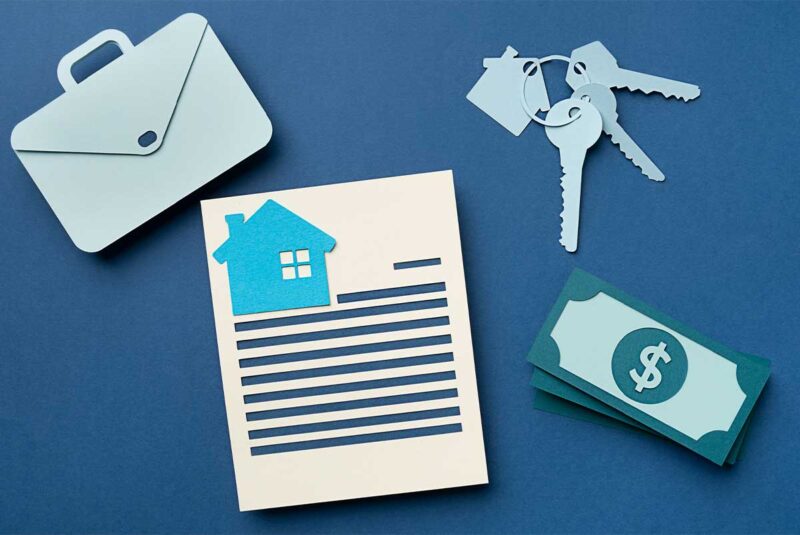Ready To Buy a Home?
Get Approved to Buy a Home
Rocket Mortgage® lets you get to house hunting sooner.
Open houses and viewings are an exciting part of the home buying process, but for many aspiring homeowners, the journey starts before they step foot in a house that’s for sale. It starts with a mortgage preapproval.
Getting preapproved is an optional, but important, step because it can streamline the process of buying a property, and it shows sellers that you’re a serious buyer with an offer from a lender to lend you a specific amount of money.
Because lenders must verify aspects of your finances, like your income streams and credit score, they’ll need documents. Keeping track of these documents can be challenging, which is why we’ve put together a mortgage preapproval checklist for you.
What Is a Mortgage Preapproval?
A mortgage preapproval is a formal process a lender undergoes to verify a borrower’s financial information. The lender uses the information to determine how much they’re willing to lend you and what kind of terms and rates you can get.
A mortgage preapproval signals to sellers that you are serious about buying their home. BTW, a mortgage preapproval can be especially useful in a seller’s market, where sellers are likely looking at multiple offers. A mortgage preapproval can give you an edge over buyers who aren’t preapproved because sellers are likely looking for buyers whose finances have been verified and will likely follow through on the sale.
What Documents Do I Need for Mortgage Preapproval?
Lenders consider a variety of factors when determining what you’re preapproved to borrow. They’ll look into your income streams, employment, assets, debts and any other relevant financial information.
Once a lender reviews your financial paperwork and qualifies you for mortgage preapproval, they’ll issue a mortgage preapproval letter. Preapproval letters are typically valid for 60 – 90 days.
If your mortgage preapproval expires before an offer is accepted, you’ll need to apply for another letter because your finances may have changed since you last applied.
Each time you apply, lenders will require a fairly tall stack of documents from you. To help you organize that stack of documents, we’ve created a checklist to keep you organized and guide you through the mortgage preapproval process.
To apply for a mortgage preapproval, you’ll need to submit:
Personal identification
Everyone included on the mortgage preapproval application is required to submit government-issued identification. Acceptable forms of ID include:
- Driver’s license
- Passport
- State or federal ID card
- Social Security number or individual taxpayer identification number
Pay stubs
Lenders want to see your pay stubs to verify that you’ll be able to handle your mortgage payments and your existing debt. Your proof of income and employment will help determine how much you borrow and at what interest rate.
Providing pay stubs is likely easiest for borrowers with regular paychecks from a single employer. You’ll typically need to provide a copy of your pay stubs from the last 30 – 60 days.
Other proof of income
If you’re a freelancer, independent contractor or you work on commission, you may not have W-2 forms or pay stubs available. But don’t worry, you can still get preapproved. In these scenarios, lenders will ask for alternative proof of steady income, such as:
- Business and personal tax returns from the last 2 years
- A year-to-date profit and loss statement
- A copy of current state or business licenses (if applicable)
- An IRS Form 4506-T (allows lenders to access your tax records)
Bank statements
Mortgage lenders usually ask for checking and savings account statements from the last several months. These statements give lenders an overview of your financial activity, including deposits and withdrawals.
Mortgage lenders also look for red flags in your financial activity. Red flags can include bounced checks, insufficient funds charges and unexplained large deposits of cash.
Bank statements may be especially helpful for self-employed borrowers, who can’t prove their income with pay stubs.
Tax documents
To verify your income and see how much was deducted for taxes, lenders generally want to see tax documents, including W-2 forms, from the last 2 years for both your current and past employers. Keep copies of your tax documents handy or request copies from the IRS or your tax preparer.
Debt statements
When you’re applying for a loan, lenders will review your debt-to-income (DTI) ratio. DTI is your monthly debt (like a loan or credit card payments) divided by your gross monthly income. Lenders may use different factors to calculate your DTI.
Lenders will need a list of your fixed, recurring monthly debts to calculate your DTI. You might be asked to provide documents for:
- Monthly rental payments
- Car loans
- Student loans
- Credit cards
- Personal loans
- Outstanding medical debt
If you currently have a mortgage, lenders may ask for a verification of mortgage (VOM). In some cases, a recent mortgage statement or other paperwork showing the loan number, monthly payment, loan balance and the borrower’s name and address will suffice. In other cases, they may ask for a VOM letter from your current mortgage lender.
Getting the letter won’t cost you anything, but it may take up to 30 business days for your lender to provide it, so ask if it’s needed sooner rather than later.
If it applies to your situation, lenders may also ask you to provide information about your homeowners insurance policy, homeowners association fees and mortgage insurance.
Real estate income
If you own a property that you use for rental income, you must provide documentation. The paperwork should include how much you make in rental income, the address, the lease and the current market value of the property (or properties).
If you own rental property, you may not qualify for first-time home buyer programs. But because real estate income is an additional income stream, it may help you qualify for a mortgage with more favorable terms.
Investment accounts
Many people generate income through investment and retirement accounts. Lenders will review your assets and investment income and use the information to potentially approve you for a larger mortgage amount or better terms. You’ll have to provide documentation for each asset or account, including:
- 401(k) plans
- 403(b) plans
- IRAs
- Stocks
- Bonds
- Mutual funds
Other preapproval documents
Depending on your financial circumstances, you might need to provide other documentation for a mortgage preapproval. The documents can include:
- Down payment gift letters: Many borrowers get help with their down payment from family or other donors. If you use a gift toward your down payment, you must show your lender a letter from the donor stating that they don’t expect to be repaid.
- Rent payment history: If you’re currently renting, lenders may ask for proof of rent payment over the last 12 months. Lenders may also require the contact information of your landlords over the last 2 years.
- Bankruptcy and/or foreclosure: If you declared bankruptcy in the past or a home you owned was foreclosed on, check with your lender to understand their requirements, including how long you may need to wait to apply for a mortgage, before reentering the housing market.
- Credit report: You don’t provide this information to the lender. Lenders will run credit checks once you’ve given them permission.
Get Preapproved To Streamline Your Home Buying Journey
Your lender’s job is to ensure that you’re a reliable borrower and that you have adequate resources to repay your mortgage. What you can borrow, the interest rate on the loan and other terms will depend on their assessment of your finances.
Once you’ve gone through the mortgage preapproval process, you’ll be better prepared when your offer is approved, and a lender does a final review of your financial history.
That’s why it’s important to keep your finances in order when you’re looking to buy a home. Organization is key. Make sure to keep track of all your relevant financial documents.
Get approved to buy a home.
Rocket Mortgage® lets you get to house hunting sooner.
The Short Version
- When a lender performs a mortgage preapproval, they verify your financial information, run a credit check and determine your creditworthiness
- The documents you’ll need to provide will vary according to your circumstances. Generally, you must provide information about your income, employment, debt and assets
- You only need one mortgage preapproval letter, but you must get a new one if the letter expires before you buy a home




